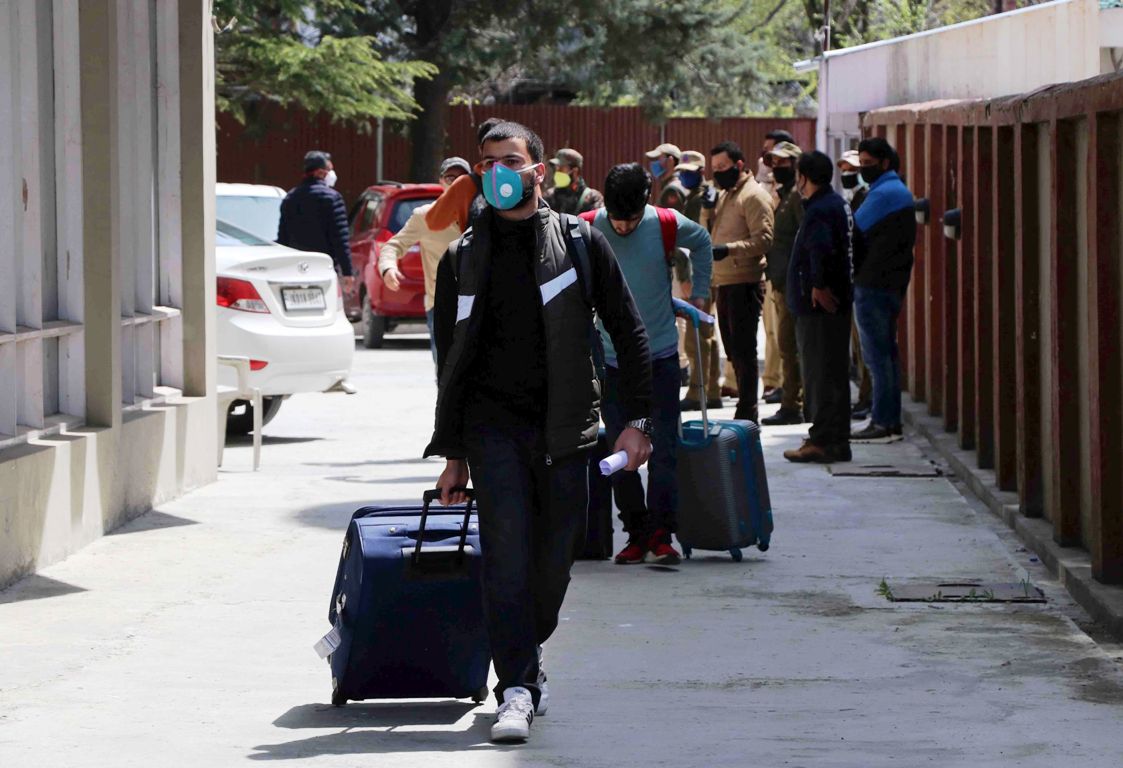Mental morbidity is a rampant issue in Kashmir. Off late, individuals requiring medications for a night of better sleep are gradually increasing and it is a new section of addicts. While the older generation is surviving the trauma of violence, the earning section of society is troubled by the economic downturn as the younger generation is induced into insomnia by the abuse of gadgets, reports Raashid Andrabi

For Nazir Ahmad, (name changed), 53, each night becomes an exhausting battle. For the past decade, he has become increasingly reliant on sleeping pills to find solace in sleep. This dependence, however, has gradually tightened its grip, leaving him uncertain about the path ahead.
Nazir’s unhealthy relationship with sleeping pills commenced years ago, a consequence of intense interrogation during the peak of militancy in Kashmir. “I can still vividly remember the grim, damp cells where I was interrogated,” Nazir recalled those distressing moments. “The trauma has never left me.”
A banker, employed by a private bank, Nazir was never left by the fear. “I am constantly haunted by the fear that someone from the forces will come and abduct me,” he said. This has profoundly affected his mental well-being.
He has never forgotten the instances when he was “suddenly whisked away in a car,” subjected to questioning on matters he had never encountered before. “Those times still give me nightmares,” he admitted. “It feels as if I am reliving those harrowing moments again and again. I toss and turn in bed, tormented by memories I long to erase.”
Nazir’s “addiction” has taken a toll on his health, as he grapples with the adverse effects of prolonged medication usage. “I am well aware that relying on these pills every night is detrimental to my well-being, but I am unable to break free. I need them to find sleep.”
Conflict Triggered Mess
Nazir’s narrative is tragically not an isolated case in Kashmir. The violence to which Kashmir was subjected to, in the last more than three decades had a profound impact on the mental health of the natives. The chronic stress, trauma, and uncertainty experienced by the population have contributed to sleep disturbances and insomnia. As a consequence, many individuals in Kashmir are seeking relief through sleeping pills.
While sleeping pills can offer temporary respite and help individuals experience better sleep, there are concerns about the long-term consequences of relying on these medications. Medical professionals and experts in the region caution against the overuse and misuse of sleeping pills, as they can lead to dependence, addiction, and negative health effects.
Aware that he is not the only person suffering from the crisis, Nazir advises the people having the same problem: “Don’t suffer in silence as I have. Reach out for help and refuse to let the trauma dictate your life.”
Pandemic Induced Insomnia
Tahir Nabi, 29, is a tech enthusiast hailing from Ganderbal. He has been grappling with insomnia since the onset of pandemic-induced lockdowns. With the ongoing crisis, Tahir was compelled to return to his native village and transition to working from home, which presented an adjustment problem for him.

“I used to spend most of my time outside, only returning indoors for a small portion of the day,” Tahir explains. “But ever since I came back and the pandemic forced me to stay at home, I felt restless.” The sudden shift to a work-from-home culture left Tahir feeling frustrated, overwhelmed and struggling to adapt.
Tahir’s experience resonates with many who have encountered boredom and frustration during the pandemic. In an attempt to cope with his insomnia and other mental health challenges, Tahir sought assistance from a psychiatrist, who reassured him that his struggles were normal. Despite seeking help, however, Tahir’s irritability escalated, leading to minor conflicts with his family over trivial matters. His sleeplessness further compounded his issues, prompting his family to seek help from a local doctor.
The doctor prescribed sleeping pills to aid Tahir’s rest, initially providing much-needed relief. “Once I started taking those pills, I felt a sense of calmness. I could sleep properly and find some peace,” Tahir admitted. However, what began as a temporary solution to his sleep troubles has since evolved into an addiction.
After a year of reliance, Tahir now finds it challenging to fall asleep without the pills, and his family and friends have observed changes in his behaviour. Drug dependency has not only affected his health and well-being but has also strained his relationships.
“If only I had been aware of the consequences associated with relying on sleeping pills for a good night’s sleep,” Tahir laments with regret in his eyes. “It’s simply not worth it.”
Addicted to Pill
Rizwan Ahmad is also an insomniac but for a different reason. A civil service aspirant from Pulwama, he started with prescribed medication to address transient insomnia resulting from late-night studying and online gaming. Now, he finds himself dependent on the benzodiazepine formulation two years later, acquiring it without a prescription from a local chemist. “I just couldn’t stop taking the pills,” he confesses.

Despite hoping for a temporary solution, Ahmad’s dependence on the pills escalated due to the stress of his demanding marketing agent role. “I started taking sleeping pills early on, but as my work schedule became increasingly hectic and sleep became elusive, I continued relying on them,” he explains. “Over time, I found myself becoming more and more dependent on them to achieve any sleep at all.”
A Roaring Market
Ahmad’s struggle is not unique in Kashmir, where many individuals have been using sleeping pills for an extended period, with no signs of the trend abating. An anonymous medical shop owner in Srinagar reports a significant surge in the demand for sleeping pills. While choosing to remain unnamed, the owner reveals that the number of people purchasing sleeping pills from their store has noticeably increased in recent years.
This reliance on sleeping pills is not limited to the elderly population; it extends to a significant number of young individuals seeking relief from stress, anxiety, and other sleep-related issues.”We have witnessed a sharp rise in the purchase of sleeping pills,” the pharmacist said. “It’s not just older individuals; we also see numerous young people turning to these pills to cope with stress, anxiety, and other sleep-related problems.”
Restricted Drugs
Sleep medication, classified as sedatives and hypnotics in pharmacology, falls under Schedule H of the Drugs and Cosmetics Act in India, making it illegal to sell without a prescription. However, despite regulations, many people can still acquire these drugs without a prescription.

Burhan Majeed, a Kashmiri employed in a pharmaceutical company, acknowledges that many chemists sell sleeping pills without prescriptions. He also notes that individuals obtain these medications using expired prescriptions or by visiting multiple chemists with the same prescription to procure a larger quantity of pills. “There is a lack of awareness about the potential risks of sleeping pill misuse, which leads people to not take it seriously,” he adds.
The market has a huge basket for inducing sleep. However, insiders in the pharmacy sector suggest there are the top six medications that are used as anti-insomnia pills, which have Alprazolam, Alprazolam, Olanzapine or Clonazepam as its basic salt. “There are many players in this sub-sector like Micro Labs, Intas Pharmaceuticals, Sun Pharmaceuticals, Torrent Pharmaceuticals and Cipla,” one senior pharmacy insider said on the condition of anonymity. “All these products sell up to Rs 2 lakh a month in Kashmir but not much.” He said he lacks details if the sale turnover of these medicines has gone up or not. Admitting that he also is aware that the use of these medicines has gone up but he lacked details about the factors responsible for it.
Experts Take
Experts attribute this increased consumption of sleeping pills to the prevailing atmosphere of stress and uncertainty in the region. Decades of political conflict and instability have plunged the region into turmoil, resulting in widespread violence and unrest. Off late, the economic instability has contributed to high levels of stress and anxiety among the populace. While the use of sleeping pills has become a common coping mechanism in Kashmir, medical experts caution against the dangers of developing such a habit.
Dr Mohammad Abrar, a Srinagar-based consultant psychiatrist, emphasises that there is always an underlying reason for the use of sleeping pills. He explains that when treating patients with sleeplessness caused by anxiety, depression, or stress, sleeping pills are typically prescribed for a short duration to provide temporary relief and improve sleep quality. However, he cautions against the misuse and overuse of these medications, as they can lead to addiction and adverse health effects such as daytime drowsiness, confusion, and memory problems.
A study conducted in the SKIMS Hospital highlighted the significant prevalence of insomnia among patients, with 45.6 percent experiencing sleeplessness. The study A Cross-sectional Study on Prevalence of Insomnia in Patients Admitted in the Medical ward of a Tertiary Care Hospital of Kashmir Valley identified various factors associated with a higher prevalence of insomnia, including age, gender, marital status, education level, employment status, rural residence, family social problems, and substance use.
“Our study revealed that the prevalence of insomnia among admitted patients was 45.6%,” the study led by Dr Syed Mudasir Qadri from the Department of Medicine, reads. “Higher prevalence of insomnia was seen in patients belonging to the age group of 52 years and above, males, married, illiterate, unemployed, who belonged to the rural area, had a social problem in the family and who used the habit-forming substance.”
The rise in sleeping pill consumption in Kashmir has shed light on the need for improved mental health resources in the region. Existing government-run psychiatric hospitals often face challenges of overcrowding and understaffing. To address this issue, increased investment in mental health infrastructure and resources is required to ensure accessible and adequate care and support for individuals in need.
The stigma surrounding mental health is another barrier to seeking help in the region.
Dr Ghulam Hassan, a somnologist and sleep specialist affiliated with the Kashmir Institute of Sleep Sciences identifies excessive gadget usage, unemployment, stress, and economic crisis as contributing factors to the reliance on sleeping pills. He highlights the need for individuals to be mindful of their smartphone usage, as it can disrupt sleep patterns and contribute to sleeplessness.
Dr Hassan also warns against the prolonged use of sleeping pills due to the potential risks of addiction and lasting effects on physical health. He advises considering alternative treatments such as cognitive-behavioural therapy and lifestyle modifications to address sleep issues.
Recent reports have highlighted the potential side effects of sleeping pills, including addiction, drowsiness, impaired coordination, memory and cognitive impairment, and respiratory depression, which can be life-threatening in some cases. Healthcare professionals recommend discussing alternatives like cognitive-behavioural therapy and implementing lifestyle changes as safer approaches to managing sleep problems.
While medical experts can help, people suffering from insomnia would also require a dependable support structure at home. Society, especially the immediate space at home, must provide a compassionate space for healing and extend a helping hand to those who have endured the unimaginable.
Way Out
Experts see trouble sleeping as normal during big changes in your life. However, they believe that when the sleep disruptions last longer than three months it can qualify as chronic insomnia, which can have long-term health consequences. In Kashmir, people suffering from insomnia opt for either of the two widely accepted solutions – some people opt go for spiritual with a preference for Tibb-e-Nabawi – the practices of the prophet of Islam; and some go for the modern cognitive behavioural therapy (CBT). Some even go for Unani and Ayurveda solutions to manage better sleep.
In Tibb-e-Nabawi individuals are supposed to go to bed early and get up early and go for Tahajjud, pre-dawn prayers, which are voluntary in nature, unlike Fajr and four other prayers in the day. Tahajjud requires getting up in the last third of the night for prayers and it helps find the tranquillity of the heart and mind and eventually paving the way for peaceful slumber.

Other practices suggested include going to bed after ablution (Wudhu, Wazu) which keeps the body clean and stays cool; having a lighter dinner, which limits chances of discomfort and indigestion, besides, avoiding daytime napping that disrupts night sleep patterns.
Interestingly, modern sleep experts and practitioners also recognise the timeless wisdom embedded in these teachings, recommending individuals incorporate these practices into their daily lives for better sleep and enhanced overall health.
CBT on the other hand revolves around a few different remedies for treating insomnia. As per it, when sleep evades you, don’t toss and turn in bed. Get up and do a calming activity. Stretch, meditate, read in dim light, or listen to a soothing podcast. Engage in creative pursuits like drawing or knitting. Return to bed only when you feel genuinely tired to break the wakefulness association.
Before bedtime, write down your worries on paper and then throw it away, letting go of your concerns symbolically. Avoid screens and phones before lying down to sleep, as they disrupt sleep quality. Use them only while standing and put them away when you feel sleepy.
Stick to a consistent wake-up time, even on weekends, to strengthen the bed-sleep connection, the CBT experts would suggest. Get some sunlight in the morning to clear morning brain fog. Keep your bed for sleep and leisure, not work. Exercise regularly, but finish at least four hours before bedtime to prevent sleep interference.















